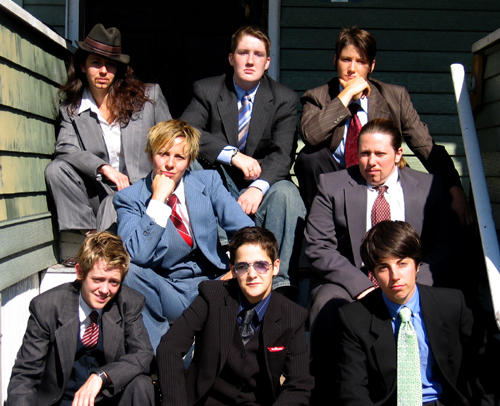One thing that puzzles me is at what point does pressure become 'marital coercion'. A husband standing over a wife with a baseball bat in hand or a husband saying "if you feel comfortable with it I would be grateful if you could take my speeding points" would both be fairly clear but there is a whole spectrum in between. Unless the judge gave specific examples I would be totally at a loss.
A deficit of understanding - how prevalent is this?
Collapse
X
-
The jury must infer from the evidence presented whether the defendant truly feels s/he has no choice but to obey.Originally posted by johnb View PostOne thing that puzzles me is at what point does pressure become 'marital coercion'. A husband standing over a wife with a baseball bat in hand or a husband saying "if you feel comfortable with it I would be grateful if you could take my speeding points" would both be fairly clear but there is a whole spectrum in between. Unless the judge gave specific examples I would be totally at a loss.It isn't given us to know those rare moments when people are wide open and the lightest touch can wither or heal. A moment too late and we can never reach them any more in this world.
Comment
-
-
 Julien Sorel
Julien Sorel
I think it's an argument for the jury system and this jury in particular - what does concern me is the possibility that Sweeney's remarks about them and the way they've been portrayed as deficient in understanding might deter future juries from asking a judge questions for fear of looking foolish (in the eyes of the judge or if it's a case attracting publicity the judge and the media and people on the internet etc.).Originally posted by french frank View PostWhich is an argument in favour of the jury system and this jury in particular. They could have felt pressurised ('I'll accept a majority verdict,' the judge had said.) But they didn't do that: they didn't feel able to arrive at a verdict and said so. The reason why they were unable to (they didn't understand the job, they didn't feel there was enough evidence, no one had brought any cash so they couldn't toss a coin, whatever it was), the interests if justice were served by their delivering no verdict on this occasion. Which they duly did ...
Comment
-
Are you sure you were listening toOriginally posted by amateur51 View PostI thougnt that there was a pretty sensible, well-informed, thoughtful and mercifully short discussionOr was it like that because the majority of the panel were women (well, presumably they still are]Any Questions this week
Comment
-
-
Now that this particular trial is over, I suppose one can comment on the general legalities, if not the specifics of the case:Originally posted by Julien Sorel View PostI think it's an argument for the jury system and this jury in particular - what does concern me is the possibility that Sweeney's remarks about them and the way they've been portrayed as deficient in understanding might deter future juries from asking a judge questions for fear of looking foolish (in the eyes of the judge or if it's a case attracting publicity the judge and the media and people on the internet etc.).
Not having been in the court myself, I don't know, but I would have thought there would have been a summing up by the judge (and presumably there was) which could have included clear indications as to what he considered the evidence had tended to show and what it had not.
'With marital coercion, it is for the 'defendant' in this case to offer evidence as to why s/he (to maintain a general point) had no choice but to yield to the marital partner's coercion even though the 'defendant' knew it would be a criminal offence. The argument of the husband/wife was xxxxx, and the intensity of the coercion was such that the husband/wife felt such stress that, as we have seen, he/she received medical treatment for stress between(date) and (date) and was received as an in-patient at xxx hospital for this between xxx and xxx. Absence from work was recorded between (date) and (date) on the grounds of acute stress. A professional counsellor (speaking with the permission of the 'defendant') has given evidence that the stated cause of the stress was the coercion by xxxx, exacerbated by the fear that publicity for xxx (husband/wife) if there was a court case would result in adverse repercussions on the family at a particularly sensitive time as son/daughter xxx was revising for GCSE maths exams. And so on and so on. There - case proved, I think, oops, no, that's for you to decide on the evidence ..."
[NB All the foregoing is imaginary and does not relate to any particular circumstances.]
But I'm not a lawyer and may already be in contempt even though i'm not talking about any case in particular, since I know nothing ...
It isn't given us to know those rare moments when people are wide open and the lightest touch can wither or heal. A moment too late and we can never reach them any more in this world.
and may already be in contempt even though i'm not talking about any case in particular, since I know nothing ...
It isn't given us to know those rare moments when people are wide open and the lightest touch can wither or heal. A moment too late and we can never reach them any more in this world.
Comment
-
-
There was.Originally posted by french frank View Post...I would have thought there would have been a summing up by the judge (and presumably there was)...
Here it is.
It is extremely detailed, but I am puzzled by this passage, which seems to be wrong in law:
"The Prosecution has chosen to bring this case, and it is for them to prove it, on all the evidence before you, if they can. There is no burden on the Defendant to prove her innocence. On the contrary, there is no burden on the Defendant to prove anything at all."
How does this square with
Marital coercion arose from the old common law rebuttable presumption that save for the most grave crimes (treason, murder), a wife could not commit a crime whilst in the presence of her husband as she was automatically assumed to have been coerced.
Perhaps surprisingly , the defence was given a statutory basis as late as 1925 with the passing of s47 of the Criminal Justice Act 1925. S47 states: “Any presumption of law that an offence committed by a wife in the presence of her husband is committed under the coercion of the husband is hereby abolished, but on a charge against a wife for any offence other than treason or murder it shall be a good defence to prove that the offence was committed in the presence of, and under the coercion of, the husband”.
A defendant relying on this defence therefore has to prove two things, on the balance of probabilities:
1. That the crime was committed in the presence of her husband
2. That the crime was committed under the coercion of her husband
No wonder the jury struggled!
But detailed as the judge's summing-up is, it never occurs to him to explain what is involved in marriage, and this is where jurors from different cultural backgrounds may have had real problems.
It is true that VP did not actually say that she was bound by her marriage vows which included obeying her husband - presumably she didn't say that because she had not made that promise. But the jurors won't know that, and some of them may have assumed that it was the case - as indeed it would have been before 1925, when marital coercion was simply assumed (see above).
Comment
-
-
Yes, two points: was there sufficient evidence to convict or acquit, and was it presented in court? (Leaving aside the discrepancy as to what was required of a defendant who claimed marital coercion.)Originally posted by jean View PostThere was.
[...]
It is extremely detailed, but I am puzzled by this passage, which seems to be wrong in law:
[...]
No wonder the jury struggled!
[...]
I don't think I can battle with the 'actualité' of this case - I'd rather return to Richard III ('My sovereign liege, did you or did you not, on or about the 26th day of June, 1483 ...')It isn't given us to know those rare moments when people are wide open and the lightest touch can wither or heal. A moment too late and we can never reach them any more in this world.
Comment
-
-
I guess you need the women there to do the teas while the men decide what the verdict should be ?Originally posted by jean View PostThe failed jury consisted of eight women and four men.
What could you expect?
This time round, it's five women and seven men.
Normal service is resumed.
(And I hope they all wear ties).
They could also check that the men's suits look dapper and their ties are on straight .......

It's like the 1970's never happened
Comment
-
-
I wonder if it was the men who couldn't understand what marital coercion was?Originally posted by jean View PostThe failed jury consisted of eight women and four men.
What could you expect?
This time round, it's five women and seven men.
Normal service is resumed.
(And I hope they all wear ties).
Comment
-
-
 scottycelt
scottycelt
Are you absolutely sure you're not a lady of the feminist persuasion, Mr GG ... ?Originally posted by MrGongGong View PostI guess you need the women there to do the teas while the men decide what the verdict should be ?
They could also check that the men's suits look dapper and their ties are on straight .......
I've never come across even Flossie expressing such horridly sexist sentiments directed at we poor, misunderstood males ...
Comment



Comment